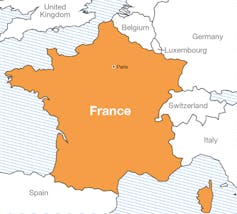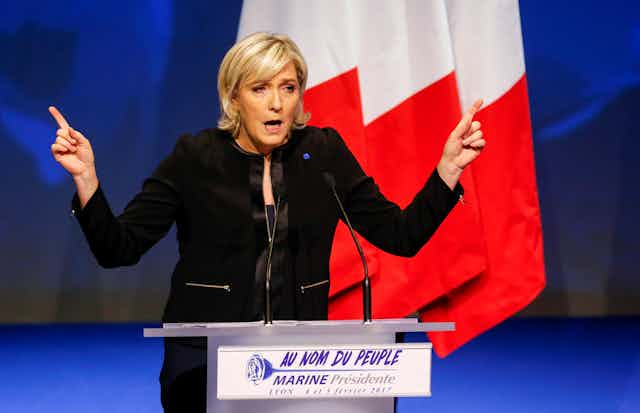
In the aftermath of the election of US President Donald Trump and the UK’s Brexit referendum, many observers are keeping a watchful eye on how presidential elections play out in France in late April and early May.
Like many European Union states, France has a populist party that is highly critical of the EU. National Front leader Marine Le Pen speaks at her packed rallies of a French exit, or Frexit.
France has, for some decades, been Germany’s partner in all major EU policy. This Franco-German linchpin would effectively be abolished if Le Pen wins, with serious implications for the EU. An editorial in Le Monde went so far as to say it would kill Europe and that Le Pen presents the EU as the source of France’s ills – and so wishes to “break Europe”.
Le Pen has declared herself to be anti-radical Islam. At her campaign launch in February, she attacked “two totalitarianisms”, namely globalisation and Islamic fundamentalism.
Many voters are concerned about austerity measures associated with the EU, which are perceived as undermining French desires to control their own state and economy. Youth unemployment in France is high at 26%, and overall unemployment is 10%. Some voters see Le Pen as fighting for French control of these issues.
Populist hyper-nationalist rhetoric is increasingly evident in contemporary France. A narrative of restoring French identity appeals in particular to the disaffected.
Although rival presidential candidates François Fillon, of the right-wing Republican party, and Le Pen are both linked with financial scandals, this does not seem to have had a negative affect to date on Le Pen’s campaign, perhaps because it relates to paying back the European Parliament and not national funding. Fillon, however, may well be obliged to withdraw his candidature.
One candidate who may stand a chance is Emmanuel Macron, former banker and former Socialist government finance minister. As leader of a movement called En Marche, he could be the youngest president ever. His platform is general in content and nation-building in tone, yet he could be the voice of the moderate centre. He has expressed admiration for German Chancellor Angela Merkel’s welcoming stance towards Syrian refugees.
The Socialists are divided about their candidate, Benoît Hamon, who is more left-wing than President François Hollande and much of the party. The Greens and other smaller parties are expected to garner few votes, despite a desire for change. In addition, observers are keeping an eye on Russian influence on the election.
The prospect of a far-right populist president is a real possibility. It is increasingly thought that Le Pen could get through to the second and final round. The key question then is: who will still be standing in the second round in May to confront her with enough credibility to win?

